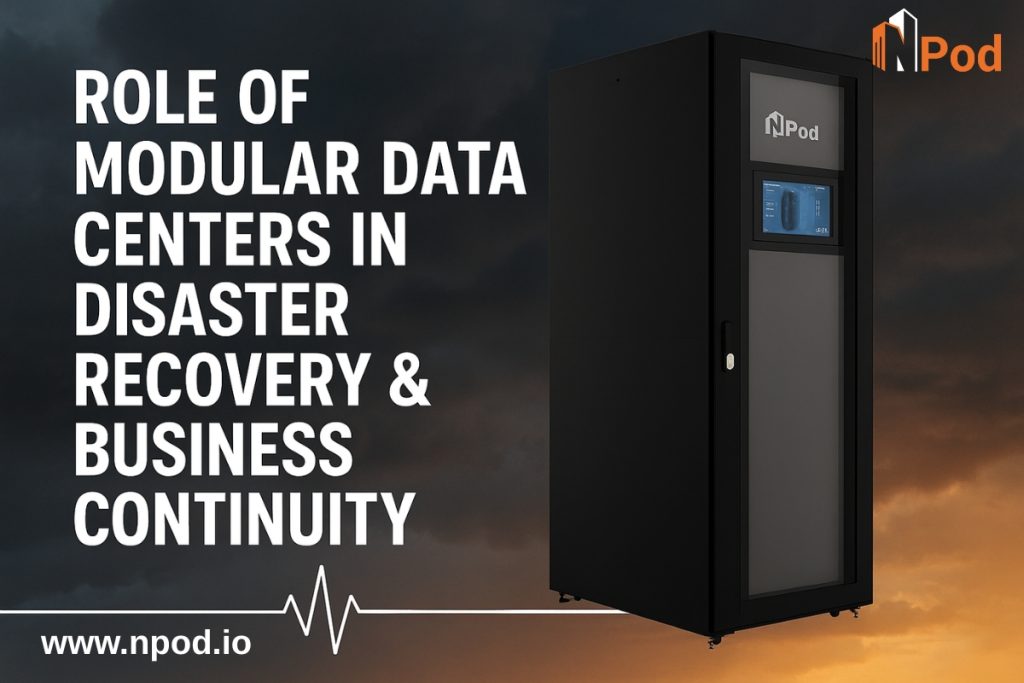In the current digital economy, business continuity is dependent on constant access to data and applications. Depending on the business, a single hour of downtime could translate into lost revenue, damaged reputation, lost compliance, or all of these. Modular data centers offer a practical, economic, and scalable basis as a solution to disaster recovery (DR) and business continuity (BC). Their flexibility and speed in the deployment make modular data centers a practical solution for organizations that want to protect mission critical operations.
Understanding Disaster Recovery and Business Continuity
Prior to discussing the function of modular data centers, it is essential to distinguish disaster recovery from business continuity:
- Disaster Recovery (DR): Returned to the process of returning the IT system, applications, and associated data to operations after an event has occurred, such as natural disasters, cyberattacks, or power outages.
- Business Continuity (BC): The process of continuing to run an organization’s critical processes during an event or disruption.
Both processes depend on resilient and scalable infrastructure, which can react to the unpredictable—and modular data centers accomplish just that.
Why Modular Data Centers Are Vital for Disaster Recovery
- Rapid Deployment in Emergencies
When a disaster occurs, time is critical. Traditional data centers often take months – some even years – to construct and become operational. Modular data centers can be deployed instead within weeks. Business can have a prefabricated secure backup site operational almost immediately for an insignificant to minimal downtime.
- Portability and Flexibility
Mobility has to be one of the greatest strengths of modular data centers in data recovery. Unlike a brick-and-mortar facility, modular units can be shipped to a location and set up in a matter of hours. For industries such as healthcare, banking, and government—where downtime is unacceptable—this ensures continuity of operations even when the primary site is damaged.
- Scalable Capacity
Disaster recovery plans should not have a cookie cutter style approach. Organizations may need and want different levels of computing and storage resource depending on the depth of the disruption. Modular data centers provide a mechanism for organizations to size up or size down their computing or storage easily. Additional modules can be deployed as workloads increase, while successfully recovering without having to participate in over-investing in data center infrastructure that is not useful to operational recovery.
- Energy Efficient Recovery
Costs associated with energy may be compounded in disaster recovery circumstances. Modular data centers have been designed in to data center structures with power optimization and cooling. This hardened resilient resource is additionally energy efficient as operationally workable group of systems during recovery and disaster operations that allow organizations to meet effective operation of critical workloads without excessive operational power costs.
- Better Security and Compliance
Data recovery is not just about uptime it is about securing data. Modular data centers are designed with built-in fire suppression, biometric access and advanced monitoring. For organizations working in regulated space, this provides confidence and reliance data integrity and data protection and compliance with data protection laws when recovering from an unanticipated disruption.
The Role of Modular Data Centers in Business Continuity
Where disaster recovery focuses on reviving operations after an incident has occurred, business continuity cares about ensuring operations don’t stop before then. Here’s how modular data centers help achieve that:
- Geographic Distribution of Backup Sites
Companies can deploy modular data centers at multiple geographic locations. This distribution enables a site to take over for another if it is compromised, ensuring continuity.
- Edge Deployments for Real-Time Processing
Certain industries may be dependent on making decisions where time is critical (financial trading, telecom, healthcare), where modular data centers can be accessed at the edge and provide localized compute power that reduces the need for a central facility, thus, in a regional outage, critical operations can still continue.
- Hybrid and Cloud Ready
Many enterprises in today’s market operate in a hybrid environment using a combination of on-premises infrastructure and a cloud service. Modular data centers are cloud ready, so workloads can be backed up, data replicated, or operations switched, all without lost time.
- Rapid Testing and Simulations
To properly prepare for business continuity, testing backup systems regularly is essential. Using a modular data center can help to deploy a temporary test environment rapidly without impacting production workloads. Businesses can simulate potential disasters and run through the recovery process quickly, getting the testing they need.
- Cost-Effective Continuity
Maintaining a secondary site in the conventional way is pretty expensive. Modular data centers give companies the opportunity to pay only for the capacity they require and expand incrementally as needed. Modular data centers provide a valuable option to businesses that want to keep control of management reliability and cost.
Real-World Use Cases of Modular Data Centers in Data Recovery
- Financial Sector: Banks must ensure ongoing uptime for transaction processing. Modular data centers can serve as redundant disaster recovery sites to enable uninterrupted digital banking services during outages in the systems, as temporary or prefabricated solutions that can be located close to branches.
- Healthcare: Modular designs have been implemented by hospitals as spare data locations to ensure seamless access of electronic medical records for patient care in emergencies.
- Government & Defense: Portable data centers enable secure availability of communication and data recovery after conflicts, disasters, or remote operations.
- Enterprises: Global enterprises utilize modular disaster recovery configurations to increase performance by reducing latency and maximizing resiliency with disaster recovery plans, or prefabricated assemblies stored at regional hubs.
Future of Disaster Recovery with Modular Data Centers
Due to increased cyberattacks, climate-related disasters and infrastructure failures, organizations will need swifter and more resilient recovery plans. Modular data centers are going to have a key role in this because they offer an innovative blend of agility, security and scalability. AI-based monitoring, liquid cooling, and automation in next generation modulars will provide even faster recovery times and increased reliability in continuity planning.
Conclusion
Business resilience is now a necessity, not an option. Organizations that are unprepared for a disaster will probably incur large penalties in terms of lost revenue, lost customer trust, and compliance violations. Modular data centers in data recovery or continuity planning provide a practical path forward that involves rapid deployment, flexibility, scalability, and costs. Whether utilized for a secondary site, edge deployment, or temporary recovery space, modular data centers present the kind of robust reliability that today’s modern enterprise needs to remain in operation no matter the circumstances.
In using modular data centers, organizations can guarantee their readiness when disaster strikes and they can expect to maintain the resilience required to continue to grow and thrive in an unpredictable, digital world.
FAQs
- What is a modular data center in disaster recovery?
A modular data center is a prefabricated, portable facility to provide a reliable backup and recovery solution for IT operations in the event of a disaster, resulting in little downtime.
- How do modular data centers assist an organization’s business continuity preparedness?
They offer organizations scalable, portable, and distributed infrastructure that can immediately take over operations when the primary data center becomes compromised.
- Are modular data centers more financially favorable than traditional backup sites?
They are financially favorable because an enterprise can start small and scale its operation, rather than building another full secondary data center.
- Can you add cloud-based recovery solutions to modular data centers?
Absolutely! Then can be hybrid-ready and are easily integrated with cloud platforms to replicate and protect data.
- Which industries have the earliest and most significant backups of disaster recovery data with a modular data center?
The banking and financial services sector, healthcare, telecom, government, and enterprises are most reliant on critical digital operations.






